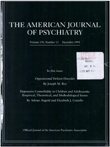The assessment and treatment of performance anxiety in musicians
Abstract
OBJECTIVE: Performance anxiety in musicians may be severe enough to require intervention but has been the subject of relatively little clinical research. The authors' objectives were to describe the results of a comprehensive clinical and laboratory assessment and to perform a double-blind, placebo-controlled study comparing buspirone, cognitive- behavior therapy, and the combination of these treatments for performance anxiety. METHOD: Ninety-four subjects were recruited by mass media announcements and were seen in a university-based outpatient psychiatric clinic. Assessments were 1) questionnaires for all 94 subjects, 2) diagnostic interview of 50 subjects, and 3) laboratory performance of 34 subjects. Treatment conditions were 1) 6 weeks of buspirone, 2) 6 weeks of placebo, 3) a five-session, group cognitive- behavior therapy program with buspirone, or 4) the cognitive-behavior therapy program with placebo. Treatment outcome measures included subjective anxiety ratings and heart rate measures during a laboratory performance, a questionnaire measure of performance confidence, and a blind rating of musical performance quality. RESULTS: All subjects fulfilled criteria for DSM-III-R social phobia. Of the 15 full-time professional musicians, ten had tried propranolol and three had stopped performing. Most of the subjects had substantial anxiety and heart rate increases during laboratory speech and musical performances. Cognitive- behavior therapy resulted in statistically significant reductions in subjective anxiety, improved quality of musical performance, and improved performance confidence. Buspirone was not an effective treatment. CONCLUSIONS: Cognitive-behavior therapy is a viable treatment approach for performance anxiety in musicians.
Access content
To read the fulltext, please use one of the options below to sign in or purchase access.- Personal login
- Institutional Login
- Sign in via OpenAthens
- Register for access
-
Please login/register if you wish to pair your device and check access availability.
Not a subscriber?
PsychiatryOnline subscription options offer access to the DSM-5 library, books, journals, CME, and patient resources. This all-in-one virtual library provides psychiatrists and mental health professionals with key resources for diagnosis, treatment, research, and professional development.
Need more help? PsychiatryOnline Customer Service may be reached by emailing [email protected] or by calling 800-368-5777 (in the U.S.) or 703-907-7322 (outside the U.S.).



